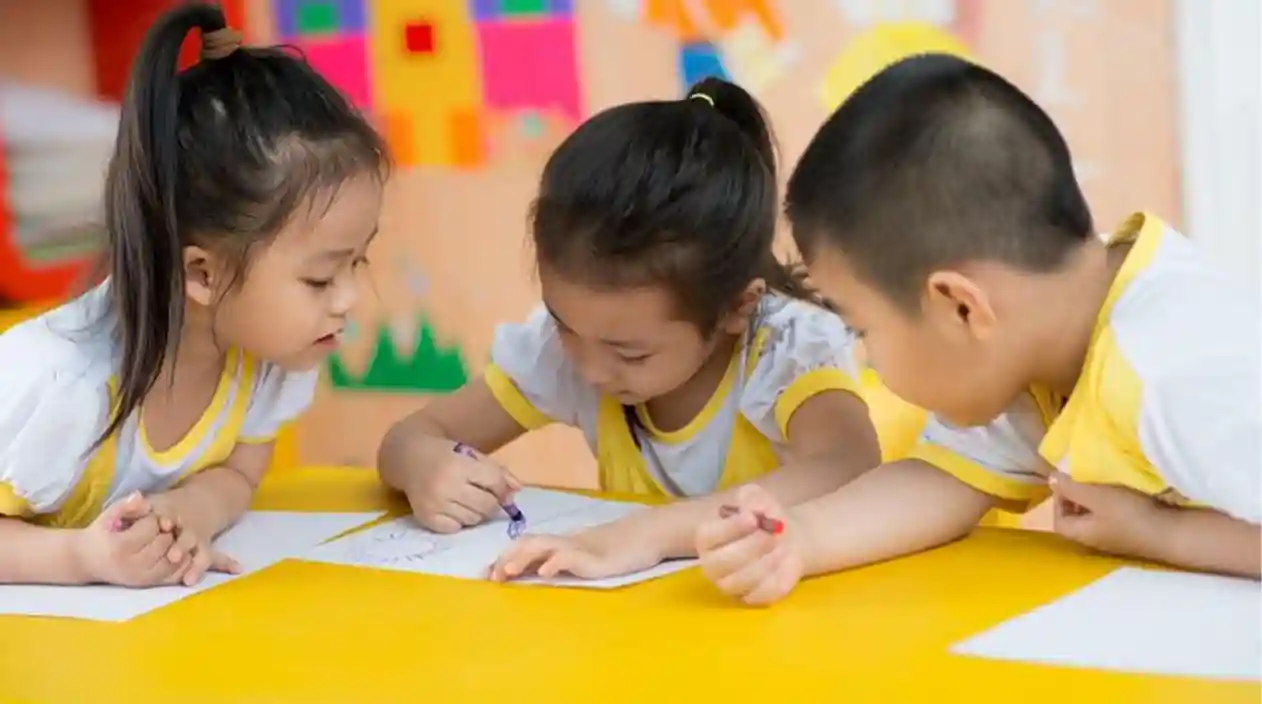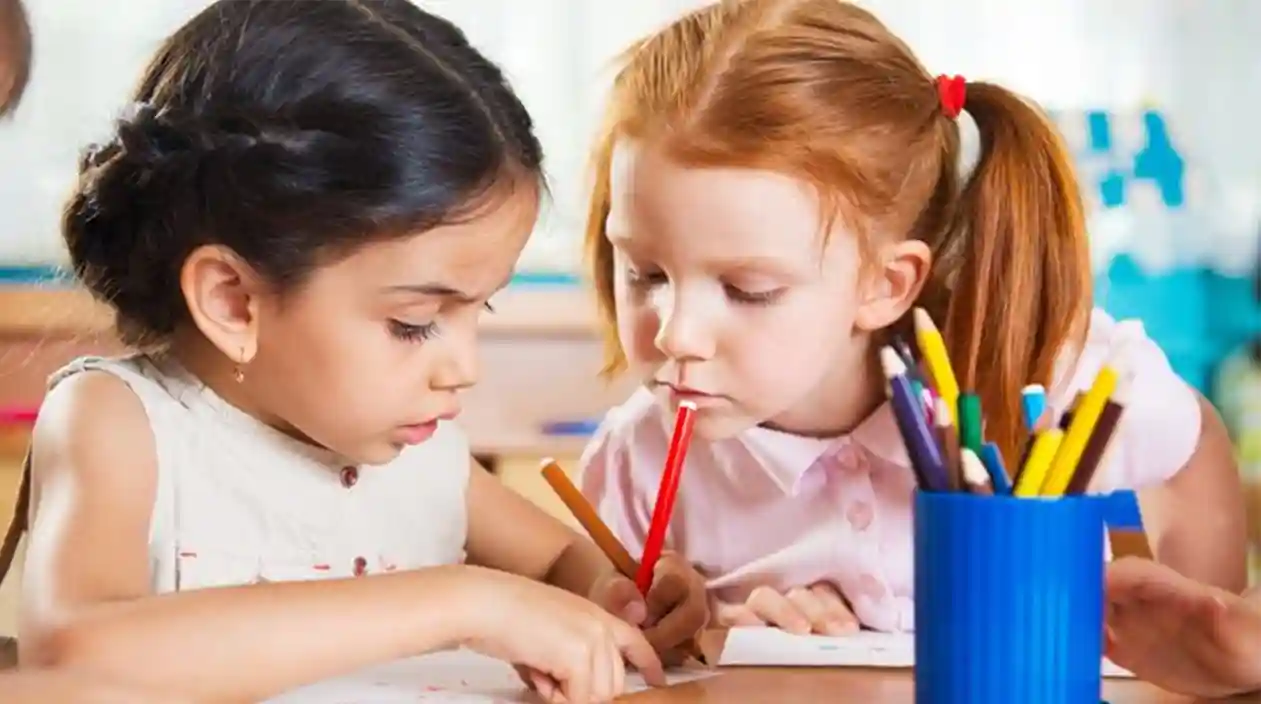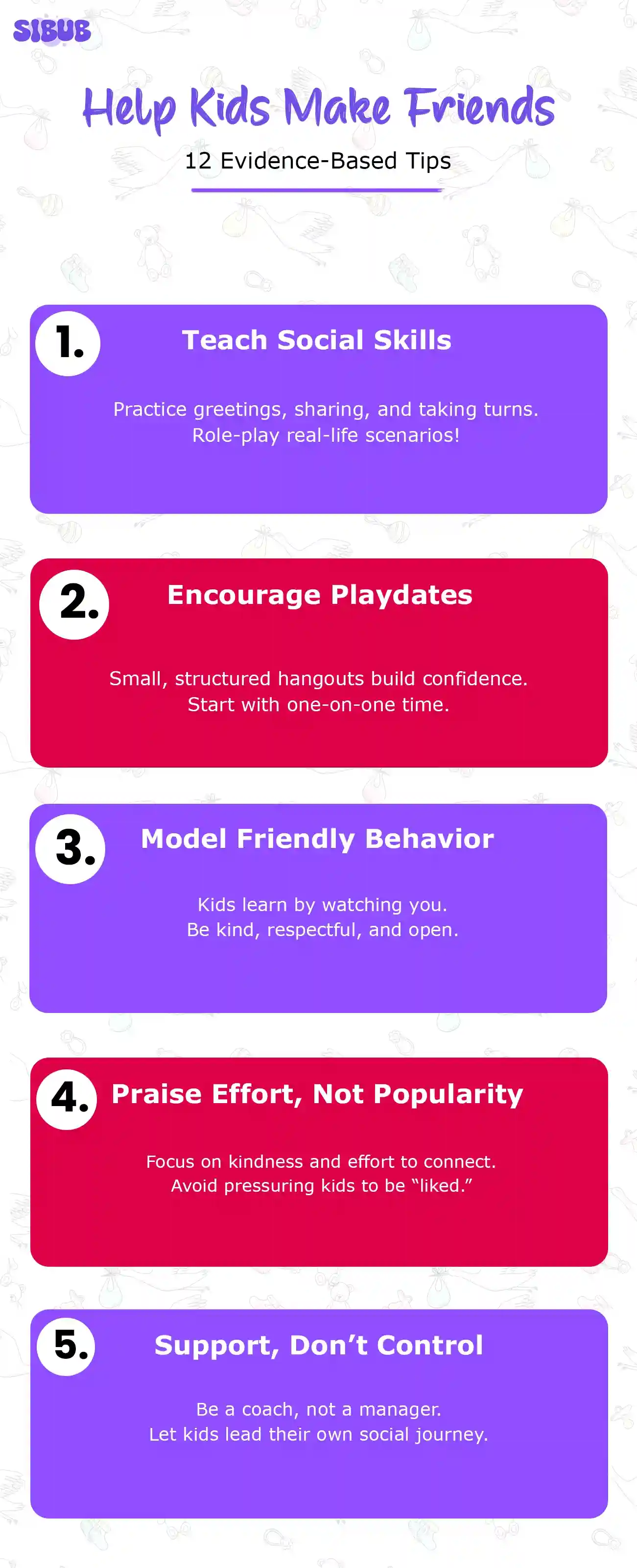Hearing your child say, “I have no friends,” can be heartbreaking for any parent out there. You may want to resolve the problem, but joining a friendship group is something children have to do on their own, with a bit of help from you.
As a parent, you can only assist them when it comes to helping, supportive guidance, and instruction about the relevant skills needed to nurture friendships.
So, have you been worried about ‘how to help your daughter make friends’, or ‘How do I help my son to make friends’ pop into your mind?
If yes, then you’re in the right spot!
Helping Kids Make Friends
This guide offers 12 essential techniques that are based on thorough research in child development. With these tips, your child will be able to feel confident and willing to interact with others to make new friendships.
Discover: ADHD Treatment For Kids: Finding The Right Medication
1. Start With Empathy
Children experience loneliness and exclusion deeply. Instead of trying to solve the situation immediately, show empathy first. Acknowledging their reality reinforces connection. Use simple phrases such as: “That must have been a tough day,” and “That could really hurt your feelings.”
Dr. Daniel Siegel, clinical professor of psychiatry at UCLA and the author of The Whole Brain Child, explains that empathy activates calming brain regions in children, helping them access more of their brain’s thinking pathways. This, a calm brain, is the key to facing social challenges.
Offering some form of comfort, such as a hug, holding hands, or sitting nearby, can also help. Gently suggest solo engagements like a stroll, ice cream, or story time. These allow children to internalize safety and support, which is the groundwork for friendship building.
2. Avoid Overreacting
When your child says they have no friends or describes a conflict, your instinct might be to jump in and fix things. You would want to call the other child’s parent or confront the situation head-on. But this can backfire. It may make your child feel powerless or embarrassed.
Dr. Ross Greene is a clinical psychologist who is known for his work on children’s behavior. He suggests that kids get benefit from learning to solve their own problems whenever possible. It teaches them responsibility and builds social resilience in them.
Unless the situation involves serious bullying or safety concerns, try to hold back. Children’s friendships are never static, they may argue and fight one day and play happily the next. Therefore, encouraging your children to work through difficulties can build important social skills in them, i.e, negotiation and compromise.
Explore: Emotions Wheel for Kids: Benefits and How to Use
3. Teach Emotional Awareness
Knowing how to make friends, and more importantly, how to keep them, requires understanding the emotions of others. Being empathetic helps children respond with patience and kindness.
“Emotion coaching” is a term articulated by Dr. John Gottman, a psychologist famous for his work on relationships. His research on the social skills of children and their parents reveals that children whose parents assist them in labeling and understanding emotions do far better with their social skills.
Ask your child questions like:
- “Why do you think she acted that way?”
- “How do you think he felt when that happened?”
- “What would you feel if you were in their shoes?”
These practices allow kids to step outside of their feelings and reduces anger while fostering empathy, an essential skill for building lasting friendships.

4. Gather the Whole Story
Kids don’t always have the full picture of what’s going on with their friends or peers. They might see themselves as the victim without realizing how their own actions affect others.
Talking to your child’s teacher can provide insights into their social interactions. Teachers often notice patterns and can suggest ways to help. Observing your child in natural settings like the playground or during playdates can also give clues.
Dr. Laura Markham, a clinical psychologist and author, says that understanding context is critical. When parents see the whole story, they can better support their child’s growth without jumping to conclusions or unfair blame.
5. Coach Social Skills Privately
Children often need assistance understanding some social “norms.” In private sessions, your child can rehearse what to say and how to respond through role-play, which eliminates real-life pressure.
As an example, Dr. Michele Borba suggests responding to teasing with “That hurt my feelings. Please stop.” These phrases can be practiced during day-to-day life. Self-calming techniques, including deep breathing and counting to ten, are also easy and teachable. Helping manage frustration will aid your kids in becoming more self-sufficient.
Aim to make these sessions enjoyable while also keeping them short. Foster self-confidence by celebrating the attempts made and not just the results. This personalized coaching allows children to feel equipped and makes them less anxious about social interactions.
6. Notice and Respect Stop Signals
Sometimes kids don’t realize when they’re annoying others. Other kids might say things like “Stop it!” or “You’re being annoying!”
These are stop signals, a way peers communicate they want the behavior to end.
Dr. Ross Greene emphasizes teaching children to notice these signals and respect them quickly. This means teaching your child to pause, say “Okay, I’ll stop,” and maybe take a step back.
You can help by practicing this at home. Role-play scenarios where your child gets a stop signal and then responds respectfully. This builds awareness and helps avoid conflict.
Learn More: Molluscum Contagiosum Treatment for Children
7. Connect Through Shared Interests
Friendships often form when children share activities they enjoy. If your child is fond of drawing, soccer, or reading, make sure to get them into clubs or teams that correspond with those activities.
Stanford’s Dr. Carol Dweck explains that seeking out new activities and working on oneself can significantly bolster self-esteem and aid in forming new connections. It also helps kids find peers with similar passions.
Ask your child:
- “What do you like to do for fun?”
- “Would you like to try a new sport or club?”
By doing things they love with others, children create natural reasons to connect and bond.

8. Practice Friendly Gestures
Small acts can make a big difference. Dr. Brené Brown, who studies vulnerability and connection, points out that simple kindness is powerful in making friends.
Encourage your child to:
- Smile when they see someone
- Say hello or ask how someone’s day is going
- Share toys or help others when they can
These gestures show openness and warmth. They signal to others, “I’m friendly and want to connect.”
Practice these at home, maybe during family dinners or while playing games, so they become natural.
9. Create Friendship Opportunities
Often, children with limited social skills refrain from inviting their friends over, saying, “I don’t know them well enough.” Social scientists, named Dr. Laura Jana, consider these invitations vital to developing friendships.
They recommend short, simple social interactions. When the guest arrives, allow your child to break the ice and choose between any predetermined activities, a game, a craft, or a movie to help him or her warm up.
Also, consider hosting family game nights with another family. These relaxed gatherings build comfort and trust over time.
Friendship is built through shared experiences, and these moments give your child the chance to deepen connections.
10. Teach Kindness Over Impressing
Many kids think they need to be the funniest or most talented to be liked. But psychologist Dr. Martin Seligman, founder of positive psychology, says that genuine kindness is what really matters.
Help your child focus on:
- Showing interest in others by asking questions
- Listening carefully and remembering things about friends
- Being thoughtful rather than boastful
Teaching kindness over impressing helps children build real connections that last beyond surface-level interactions.
11. Model Healthy Friendships
Kids learn a lot by watching their parents. Show your child what friendship looks like by sharing your experiences, both the joys and the nervous moments.
Dr. Wendy Mogel, a clinical psychologist and author, says that when parents model vulnerability and genuine connection, children learn it’s okay to be open and authentic.
You might say:
- “I’m meeting my friend for coffee; I’m excited!”
- “It feels a little scary to call someone new, but I’m doing it anyway.”
This teaches children that making friends is a process everyone experiences, not just them.

12. Seek Professional Support if Needed
Sometimes, kids face challenges that need extra help. If your child is bullied, socially anxious, or struggling for weeks, it’s important to reach out.
School counselors, therapists, or social skills groups offer safe environments where children can practice friendship skills and build confidence.
Dr. Ross Greene points out that early intervention is key. Getting support sooner can prevent long-term issues and help your child feel more comfortable in social settings.
Check more blogs For Parents.
Ultimately…
Helping your child make friends with kids isn’t about fixing their social life for them. It’s about equipping them with the tools, empathy, and confidence to build meaningful friendships themselves.
We have provided you all the answers to your concerns, i.e, how do I make new friends or how to help your son make friends, etc., and these expert-backed strategies will help you with a clear path forward.
Now, it’s your turn,
Friendship is a journey; with your support, your child can thrive!
